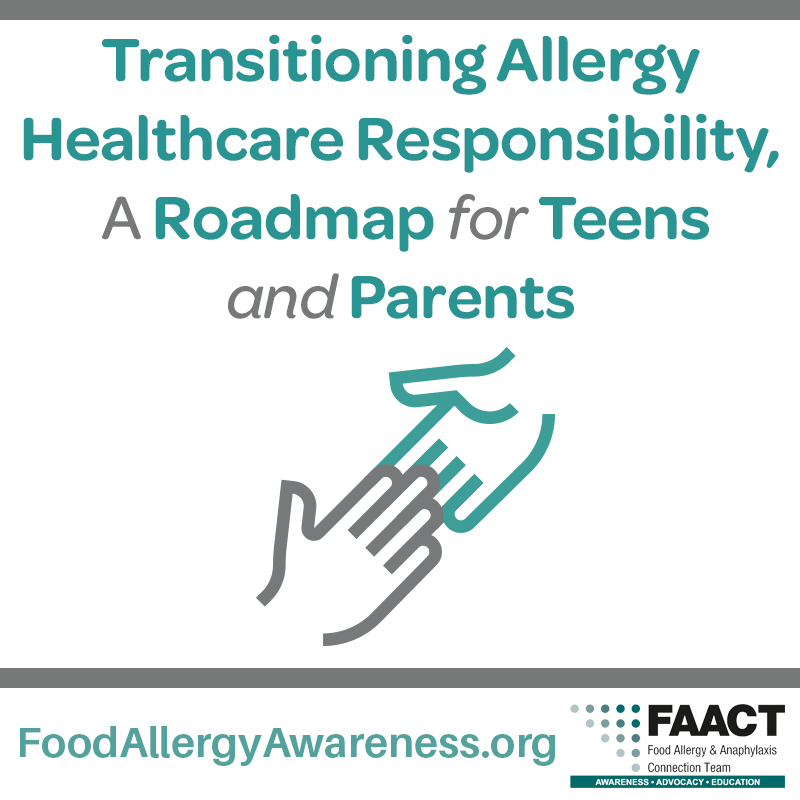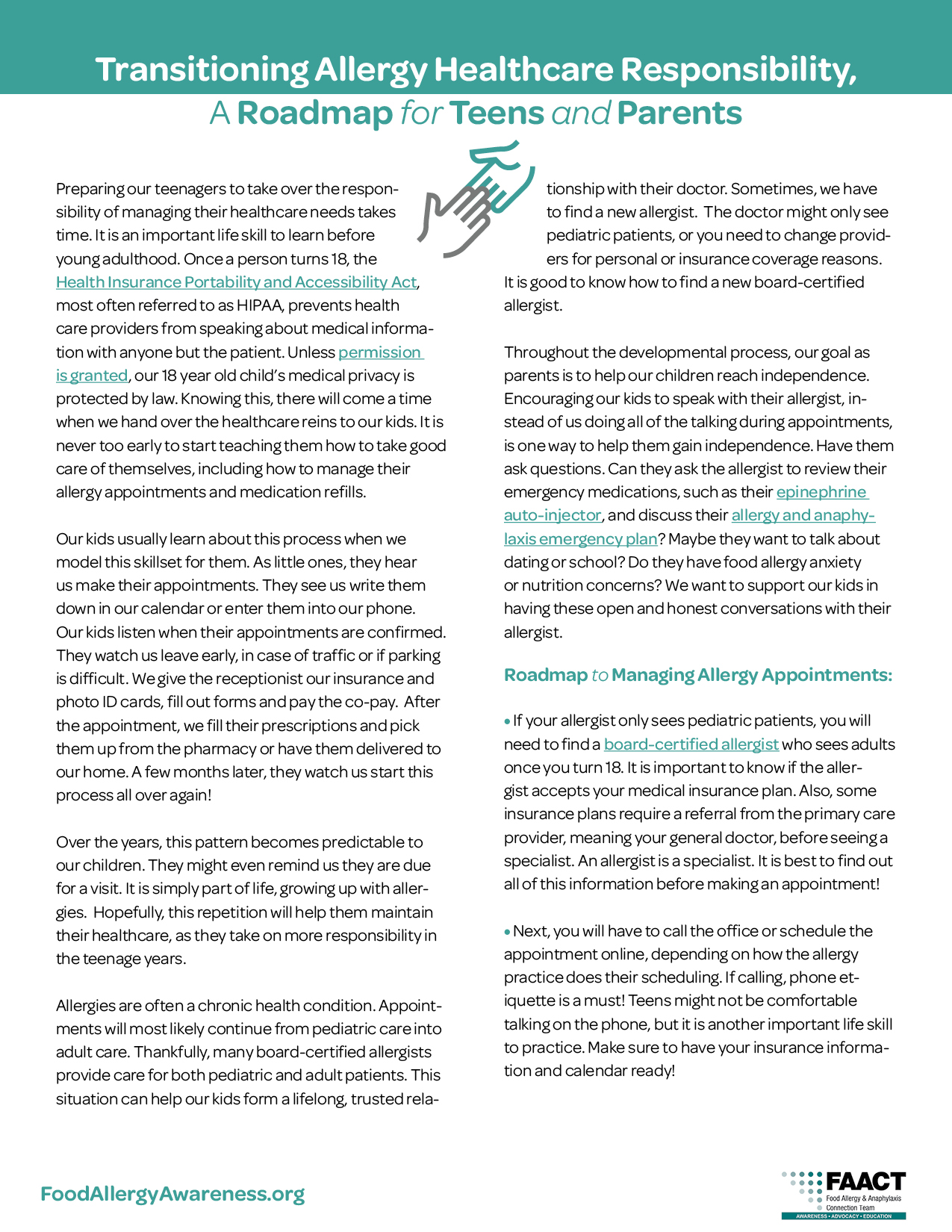Education
Family Activities at Home
Back to Category View
Transitioning Allergy Healthcare Responsibility, A Roadmap for Teens and Parents
Preparing our teenagers to take over the responsibility of managing their healthcare needs takes time. It is an important life skill to learn before young adulthood. Once a person turns 18, the Health Insurance Portability and Accessibility Act, most often referred to as HIPAA, prevents health care providers from speaking about medical information with anyone but the patient. Unless permission is granted, our 18-year-old child’s medical privacy is protected by law. Knowing this, there will come a time when we hand over the healthcare reins to our kids. It is never too early to start teaching them how to take good care of themselves, including how to manage their allergy appointments and medication refills.
Our kids usually learn about this process when we model this skillset for them. As little ones, they hear us make their appointments. They see us write them down in our calendar or enter them into our phone. Our kids listen when their appointments are confirmed. They watch us leave early, in case of traffic or if parking is difficult. We give the receptionist our insurance and photo ID cards, fill out forms and pay the co-pay. After the appointment, we fill their prescriptions and pick them up from the pharmacy or have them delivered to our home. A few months later, they watch us start this process all over again!
Over the years, this pattern becomes predictable to our children. They might even remind us they are due for a visit. It is simply part of life, growing up with allergies. Hopefully, this repetition will help them maintain their healthcare, as they take on more responsibility in the teenage years.
Allergies are often a chronic health condition. Appointments will most likely continue from pediatric care into adult care. Thankfully, many board-certified allergists provide care for both pediatric and adult patients. This situation can help our kids form a lifelong, trusted relationship with their doctor. Sometimes, we have to find a new allergist. The doctor might only see pediatric patients, or you need to change providers for personal or insurance coverage reasons. It is good to know how to find a new board-certified allergist.
Throughout the developmental process, our goal as parents is to help our children reach independence. Encouraging our kids to speak with their allergist, instead of us doing all of the talking during appointments, is one way to help them gain independence. Have them ask questions. Can they ask the allergist to review their emergency medications, such as their epinephrine auto-injector, and discuss their allergy and anaphylaxis emergency plan? Maybe they want to talk about dating or school? Do they have food allergy anxiety or nutrition concerns? We want to support our kids in having these open and honest conversations with their allergist.
Roadmap to Managing Allergy Appointments:
- If your allergist only sees pediatric patients, you will need to find a board-certified allergist who sees adults once you turn 18. It is important to know if the allergist accepts your medical insurance plan. Also, some insurance plans require a referral from the primary care provider, meaning your general doctor, before seeing a specialist. An allergist is a specialist. It is best to find out all of this information before making an appointment!
- Next, you will have to call the office or schedule the appointment online, depending on how the allergy practice does their scheduling. If calling, phone etiquette is a must! Teens might not be comfortable talking on the phone, but it is another important life skill to practice. Make sure to have your insurance information and calendar ready!
- Once the appointment is made, write it down. Set an alert on your phone or mark it in your calendar as a reminder. If you have to cancel, be sure to call the office well in advance to avoid a possible “no show” or “cancellation” fee.
- Enter the allergist’s name and address in your phone or write it down to keep in your wallet. It is helpful to have this for contact purposes and for directions to the office.
- Write down the name, phone number and address of your pediatrician or primary health care provider. List any medical, surgical, or important family medical history (such as diabetes, heart disease or cancer), and any medications and/or supplements you take (including vitamins). List any allergies you have, such as those to medications, foods, latex, or stinging insects. Store this list in your phone or wallet. You will most likely need this information when filling out your medical forms.
- Write down the name, phone number, and address of your pharmacy, and any medications you might need refilled. The allergist will appreciate having this information available!
- Make a list of any questions you might have for your doctor. It is easy to forget what you want to ask during an appointment.
- On the day of the appointment, be sure to arrive about 15 minutes early. Bring your medical insurance card and photo ID. Do not forget about the co-pay! Does the office accept cash, check, credit, or flex spending cards? This is good to know in advance. Learning how to budget and pay for your healthcare is also an important life skill!
- After the appointment, schedule any follow up visits, fill and pick up any medications from the pharmacy. Finally, congratulate yourself on a job well done! Phew!
References:
FAACT’s Epinephrine Auto-injector Options Poster
AAP’s Allergy and Anaphylaxis Emergency Plan
ACAAI: Teens with Allergy and Asthma – Start Prepping Now for College
Allergy & Asthma Network: How to Help Teenagers Transition to Asthma and Allergy Self-care
Consumer Reports: Will You Be Able to Help Your College-Age Child in a Medical Emergency?
Got Transition: Turning 18 – What It Means for Your Health
Got Transition: Setting Up Medical ID’s on Smart Phones
Mott Poll Report: Can their 18-year-olds make an appointment? Half of parents say no.
New York Times: How Young People Can Own Their Healthcare (Even If They Still See a Pediatrician)
Science Daily: Less than half of parents think their 18-year-olds can make a doctors appointment
